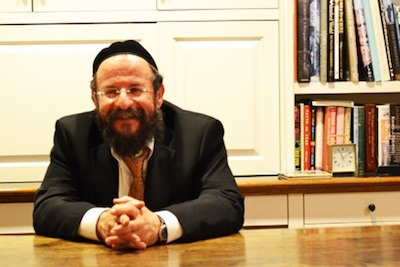By Emily K. Alhadeff , Associate Editor, JTNews
Have you heard this one? An American Jewish woman travels to the Himalayas in search of a famous guru. She finds a Sherpa, who cautions her about the perilous trek. And, he warns, “Once we get there, you are only allowed to speak three words to the holy man.”
She consents. She must see the guru at all costs! Finally, they arrive at the mountaintop where the guru spends his days meditating. The Sherpa warns her again: Only three words. The woman walks up to the guru and says, “Sheldon, come home!”
It’s a joke, but in all humor lies truth. From March 8 to 10, Rabbi Michael Skobac of the Toronto-based Jews for Judaism visited Seattle to give three lectures to members of Congregation Ezra Bessaroth, during which he presented on the differences between Judaism and Christianity, Judaism’s public relations problem, and the role of meditation in Jewish life.
Jews for Judaism was founded in 1985 to counter Christian missionary activities aimed at Jews, and grew to address various cults. Skobac makes himself available for questions at Jews for Jesus conferences, leads Passover seders in India for Jews and Israelis on an Eastern spiritual quest, puts out YouTube videos, and leads classes on subjects like Judaism and vegetarianism, ecology, and meditation — values that often lead Jews away from Judaism.
“The goal is basically to serve as a catalyst to help Jewish people appreciate the spiritual treasures of Judaism,” Skobac told JTNews after his final talk. Skobac said the organization strives “to give people more of an appreciation of what they have in their own backyard.”
Bearded, suited, and topped by a black fedora, Skobac is visibly Orthodox. But he wasn’t always this way. At his talk, “Is Religion Killing Judaism?” after Shabbat-morning kiddush, he revealed that he was designated “class anti-Semite” by his high school, and he spent his first years at Northwestern University shunning Judaism and advocating for human rights, even going on a three-week hunger strike. When challenged to examine the culture he despised, but knew little about, he fell in love with it. The people he has been addressing for three decades, he said, are not so different from his younger self.
“I realized about 15 years ago that Jews for Jesus is not the problem,” said Skobac. “They were a symptom of the problem. The problem is that Jews are disconnected from the spiritual core of Judaism. So when they’re disconnected from that, they can end up in a Buddhist [temple], in a Hindu [ashram], in a Sufi place or a Sikh place or Baha’i or whatever.”
The typical profile of the people Skobac meets looks like this: “I grew up in a Jewish home, I went to Hebrew school, had a Bar or Bat Mitzvah, we had a Passover seder every year. We lit Hanukkah candles,” he explained. “But I never experienced it in a spiritual way. I experienced it as my culture, my heritage, my history, my identity, my tradition, but God was never part of it. It was never a spiritual thing.”
Judaism has a PR problem, he said. It’s misunderstood as a religion lacking spirituality — lacking, most crucially, God and growth.
“Religion is seen as a crutch for people who need it,” said Skobac. “What attracts them to Christianity is that evangelical Christians are passionate about God. They’re God-intoxicated. That’s what people want. They want a relationship with God. They don’t want religion.”
While Jews for Jesus is much larger now that it has a second generation, Skobac explained that the bulk of Jewish conversion to Christianity is not through formal missionary activity, messianic Jewish or otherwise evangelical.
“It’s through Christian friends, Christian neighbors, Christian business associates, [who] in very different kinds of ways share their faith,” he said.
On the other side of the coin is the flight of Jews to Eastern religions.
“People see Buddhism as the technology for personal growth,” he said.
At his Saturday night talk, Skobac highlighted the ways Judaism is in fact a mindfulness practice.
“My wife is part of a Mussar group, and usually they’ll spend two to four years on an issue,” he said. “There are Jewish teachers who say we’re only here for “˜tikkun ha’middot’ [perfection of our character traits], and if we’re not doing that, we’re wasting our entire life. I think that many Jews don’t do that. It’s not part of their world.”
If these concepts were so integral to Judaism, why did they fade from the mainstream?
“Why did God get lost?” Skobac responded.
But for these post-Holocaust generations, particularly the younger ones steeped in a culture of science, God may not be an easy concept. How can Jews for Judaism inspire Jews to love God?
“Science can only answer “˜what.’ It can never answer “˜why,’” he said. “It can never explain why we’re here.”
As for large-scale tragedy, Skobac admits he has no comprehensive answer.
“We live in a world where we have freedom to make choices, and with that freedom comes great responsibility, and also, it can be abused. It helps us understand man-made evil, but it doesn’t help us understand God-made evil. Human beings didn’t cause the tsunami. For that I have no thought…The Bible says about that there are limits to what humans can understand about God.”
It’s a very Jewish answer. But hard questions aside, Skobac reiterates that Judaism has something for all Jews.
“If Jews could be more connected spiritually to Judaism, there’s less chance they’re going to go elsewhere, or assimilate into non-descript North Americans, or marry out of the faith,” he said. “It’s like preventative medicine. Rather than worrying about curing illnesses, we want to build health.”
